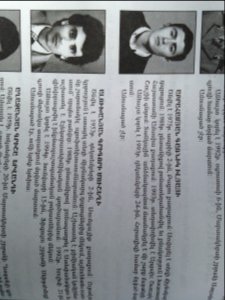August 30 has been designated as the International Day of the Disappeared. On this day, the International Committee of the Red Cross (ICRC) calls on the international community to “show greater awareness” of the situation of those who have gone missing and the plight of their families—an issue that is often neglected. The Artsakh war and its aftermath claimed thousands of lives; it also left hundreds of families wondering about the fate of their relatives who were lost without a trace.

“In over 70 countries and territories around the world, the ICRC has files open on people who have disappeared. We call them ‘open tracing cases,’ but behind every ‘case’ is a family desperate to know what has happened. And they have a right to know, enshrined in international humanitarian law,” read a statement by the ICRC.
As a consequence of the Karabagh conflict, the number of people who have been registered as missing in Armenia and NKR surpasses 400, according to sources.
The late Galya Arustamyan, Founder of the Museum of Fallen Soldiers in Stepanakert, NKR, kept track of the names, photographs, and biographies of those who went missing as a consequence of the Artsakh war—which she also documented in her book, “RMK National Liberation Struggle, 1988-2009.” She dedicated the third part of her 895-page book to those who went missing. In the foreword, she wrote, “…Only their fate is unknown. Their life, their being, is with us always; they are alive in our hearts and memories. They are alive, even though they are no longer with us. They are alive, as they don’t have graves to affirm their deaths…”

The ICRC, which has been working in Armenia since 1992, highlights the importance of providing support to the families of those who have disappeared. “When people disappear, there are two kinds of victims: the individuals who have gone missing and their families, torn between despair and hope, living with uncertainty and pain, waiting for news, sometimes for decades,” explained Marianne Pecassou, who heads the activities carried out by the ICRC for missing persons and their families.
The ICRC has been collaborating with the Armenian authorities to determine what has happened to the registered missing persons. It is also collecting DNA samples to be able to identify human remains wherever they are located.
According to Pecassou, ICRC is currently working on locating over 52,000 missing people around the world who have disappeared due to armed conflicts, natural disasters, or migration. “This figure is just the tip of the iceberg, since these cases are only the ones brought to the attention of the ICRC by relatives. We know that many more people remain unaccounted for around the world,” said Pecassou.
Christine Beerli, vice-president of ICRC, insisted that the International community must play an active role. “States have an obligation under international humanitarian law to take all feasible measures to clarify the fate and whereabouts of people who have gone missing to inform their families accordingly,” she said during a commemorative event at the ICRC headquarters.
The International Day of the Disappeared is a day created by the Latin American Federation of Associations for Relatives of Detained-Disappeared, a non-governmental organization founded in 1981 in Costa Rica. The association was working against secret imprisonment and forced disappearances in many Latin-American countries.


Be the first to comment